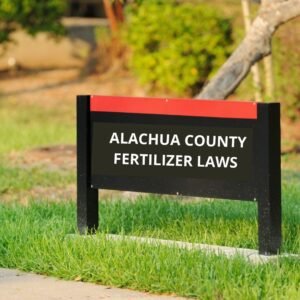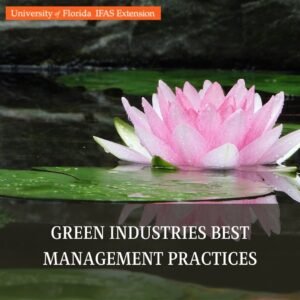It’s that time of year again: Christmas is behind us and we’re now entering that bleak, brown season of winter. While we don’t quite see the same type of winter weather as our friends in the Midwest and Northeast, North Florida isn’t immune to the effect of changing seasons. Right now, you’re probably looking at your lawn wondering why it isn’t green and if fertilizer might help give your yard a boost. Here’s the thing: depending on what time of year it is and where you live, it may actually be illegal to use fertilizer. Let’s look at lawn laws as we unpack our homeowners’ guide to lawn care and laws in Gainesville, Florida.
Do lawn laws really matter?
It can be frustrating, but lawn laws really do matter. There are several solid reasons why various counties and communities limit what homeowners can and can’t do to their lawn.
As a basic example, during the dry, summer seasons in Western states such as Arizona and California, the various local and state governments choose to limit how often (if at all) you’re allowed to water your grass. This isn’t because they’re trying to restrict the homeowner. Rather, it’s more about conserving water during droughts. If everyone waters their lawn at the same time, that combined action will severely impact the water table.
Likewise, here in the South local government designed fertilizer laws to protect our unique environment. This also has the added benefit of keeping groundwater supplies healthy and free of toxins. But, in order to do so, lawn care laws will limit when you can and can’t apply fertilizer to your yard.
 Alachua County fertilizer laws
Alachua County fertilizer laws
In Alachua County, fertilizer laws were enacted in the Fall of 2019, taking effect in June of 2020. The fertilizer ban runs from July through February of each year, meaning that spring is your best opportunity to fertilize your yard. However, there are certain restrictions where fertilizer cannot be used at all, including:
- Places where you’ve applied seed or sod within the past 30 days;
- Impervious surfaces, and;
- Within ten feet of any body of water.
And as with watering out West, Alachua County chose to enact these regulations to protect the health of our community. There are several other aspects to keep in mind when you are allowed to use fertilizer, such as:
- Fertilizers with nitrogen must contain no less than 50% slow-release nitrogen;
- Phosphorus is prohibited unless a soil test confirms a deficiency;
- Signage must be in place throughout stores that sell fertilizer, and;
- Homeowners must always clean up grass clipping immediately and not leave them to the elements.
Your homeowner’s lawn care guide
With such stringent regulations, is it even possible to have a green yard? Yes, although we want to raise a point of caution.
Green grass year-round isn’t always possible.
Even with our three steps below, you’ll likely discover that it takes time to restore your grass to its natural beauty.
Here’s the thing: just like weight loss, restoring your lawn’s health takes time. Think about our collective “quarantine weight” from the past few years. Some of us took it upon ourselves to join the gym once communities pushed for social distancing. Others discovered gradually expanding waistlines.
In either situation, getting in shape takes time. Weight loss doesn’t happen overnight. Likewise, building a healthy base for your yard to thrive is an ongoing process.
And as we mentioned, we want to prepare you for the idea that there are times throughout the year that your grass will naturally darken and even turn brown. This is simply the cyclical part of nature running its course. Nevertheless, these three steps will help you establish a solid foundation for your lawn both today and in the future.
Step 1: Do a soil test
Do you remember your mom or dad using little tiny test tubes to check the PH levels of your backyard pool? Too much chlorine and not enough can both have detrimental effects on your pool water. The same is true with your soil: various things change the PH, making it too acidic or alkaline.
For example, did you know that if you allow pine needles to decompose they can actually change the PH of your soil? Little things like that can affect it. Also, different kinds of grass require different PH mixes, such as St. Augustine actually prefers a neutral PH balance.
Test your soil every month. This can help you gauge your soil’s health and how it’ll affect your grass over the coming months. In addition, if there has been a change since your last test it’ll bring this to your attention. Finally, it will identify what things you need to keep an eye on in the future.
Step 2: Take a refresher course on green industries best practice guidelines 
When we say “take a refresher course”, we’re not actually referring to enrolling in a local university. Rather, there are online resources that can help you better understand green best practices.
Since Alachua County has effectively banned fertilizer for a good portion of the year, looking for and utilizing non-fertilizer methods can help you promote strong grass health. HERE is a great resource from the University of Florida that explains some basic ideas (and is what we follow as the region’s premier lawn care maintenance company).
In addition, other online resources can educate you on everything from how often to mow grass to irrigation to how to prepare your lawn for spring.
Step 3: Keep leaves and pine needles off of your lawn
We mentioned it a little bit ago, but it bears repeating. Leaves and pine needles can both affect your lawn’s health. Decomposing pine needles can actually make your lawn too acidic for grass growth. In turn, this can prematurely cause your yard to turn brown if not properly treated.
Leaves, as they fall, create a barrier. They trap moisture in and keep both light and air out, effectively smothering your grass.
Hire someone who understands Florida lawn care laws
With these three steps — performing regular soil tests, educating yourself on green best practices, and keeping pine needles as well as leaves off of your lawn — you’ll be well on your way to restoring your yard to its green, lush appearance. Of course, this takes time to perfect, which is why many homeowners choose to work with us for all of their lawn care needs. From mowing to mulch maintenance and more, we’re here to help. Contact us to set up a time for one of our team members to stop by and give you a free estimate for our services.
Here are some great resources to help your lawn looks its best:

